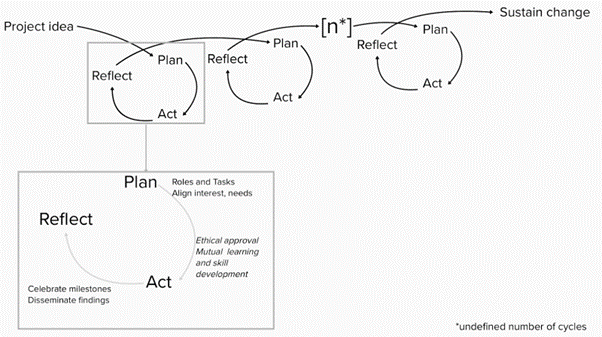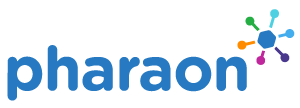
04 Jul Framework for eHealth Action Research
Pharaon developed a framework for eHealth Action Research which was evaluated with consortium partners and experts from the field and other researchers from practice, outside of the Pharaon consortium, to increase the applicability of the framework. The framework consists of different elements: an introductory text and figure, sections for all elements of the framework with an explanation and pointer questions for each, as well as an appendix with additional (reading) materials. The introduction provides more information about Action Research, and visualises what an Action Research project might look like.

The main part of the framework is divided into different sections that represent important steps and elements in the Action Research process. Each section starts with a brief text to provide some background, followed by a set of questions. These questions are meant as a (self-)check for Action Researchers and should help them structure their projects without forgetting important elements:
- Project idea: The first section of the framework focuses on the collaborative development of a project idea, together with stakeholders. Topics that should be carefully considered from the start, like reimbursement and representation of relevant stakeholder groups, are brought up in this section.
- Plan: roles and tasks: This section poses questions about who should be involved in a project, and in what way they will be involved. This includes for example agreements about communication and mitigation plans for foreseen risks.
- Plan: align interests and needs: Different stakeholders might bring conflicting ideas into a project, which is what this section is focused on. The questions posed are about identifying and dealing with potential conflicts in the interests and needs of the involved parties.
- Ethical approval: Ethical approval can be more difficult to obtain for Action Research projects where objectives and methods are subject to change over the course of the project. Therefore, this section addresses topics like good contact with ethical committees and adequate provision of information to co-researchers, to allow ethical participation.
- Mutual learning and skill development: This section is about the skills that both researchers and stakeholders might need to learn from each other to successfully complete their tasks in the project. The questions focus on aspects like identification of training needs, and accessibility of the training.
- Act: celebrate milestones and learn from failures: An important element of AR is to extend scientific knowledge, which is why learning from failure and sharing these lessons learned is crucial. On the other hand, the things that a project achieved, whether big or small, should be adequately celebrated. The questions in this section thus focus on the successes as well as failures of a project.
- Act: dissemination: As mentioned above, scientific knowledge stemming from an Action Research project should be shared, but at the same time, findings should be shared within the community that the research takes place in. Topics in this section include identifying target audiences and finding suitable ways of disseminating.
- Reflect: Reflection is a key element of Action Research, and this section provides guiding questions to support the reflexivity in a project. Questions in this section deal with how best to structure and conduct the reflection together with stakeholders, and how the findings from a reflection can be implemented and sustained in a project.
- Sustain change: The final part of the project focuses on ways to make sure that the changes that a project has introduced don’t end when the project is officially over. The section highlights that this needs to be planned for early on in the process, for example by looking at ways to implement findings in policy, or by securing additional funding.
More detailed information can be found on the Roessingh Research and Development website, freely available for download and use.

